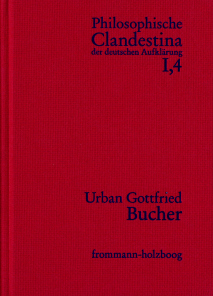You are here
Series » Philosophische Clandestina der deutschen Aufklärung » Abteilung I: Texte und Dokumente »Band 4: Urban Gottfried Bucher (1679–1724)
Links / Downloads
The physician U. G. Bucher was a student of Friedrich Hoffmann, who together with Boerhave in Leiden and Stahl in Halle was one of the three major theoreticians of medicine in the early 18th century. The ›Brief-Wechsel‹ (Correspondence), presumably written by Bucher, is the most important contribution of German freethinking to the criticism of spiritualist rational psychology. The standpoint expressed in the ›Brief-Wechsel‹ is a materialism which originated from medical and philosophical sources (Hobbes among others) on the basis of which a sensualistic epistemology is outlined.
Contents:
- Urban Gottfried Bucher: Zweyer Guten Freunde vertrauter Brieff-Wechsel vom Wesen der Seelen (1723)
Dokumente:
Johann Gottlob Dietrich / Gottfried Klemm: Dissertatio physica de anima brutorum (1704)
Friedrich Hoffmann / Urban Gottfried Bucher: Leges naturae in corporum productione et conservatione (1707)
Johann Heinrich Heucher / Samuel Christoph Ursinus: Exercitatio physico-mathematica de mechanicis non mechanicis (1708)
Johann Andreas Planer / Matthäus Eliser Wende: Nova de animae humanae propagatione sententia (1712)
Valentin Ernst Löscher: Unschuldige Nachrichten von alten und neuen theologischen Sachen, Büchern, Uhrkunden, Controversien, Anmerckungen und Vorschlägen (1713)
Johann Franz Budde: De Arabicorum Haeresi commentatio (1713)
Polycarp Müller: Mens substantia, a corpore essentialiter diversa (1714)
August Friedrich Cämmerer: Untersuchung von der Seelen [...] (1714)
Johann Hermann von Elswich: Recentiores de anima controversiae (1717)
Konkordanz der Ausgaben von 1713 und 1723 des Briefwechsels
Reviews
Mulsows Vorgehen als Spurensuche ist historisch nicht unproblematisch, und zwar insbesondere dann, wenn die begründeten Zusatzannahmen unverkennbar spekulative Züge annehmen, und doch ist sie in sachlicher Hinsicht anregungsreich. Beachtet man den hypothetischen Vorbehalt, dann öffnet die Kreativität der begründeten Vermutung über die mit ihrer Hilfe geschaffenen Verbindungen neue Perspektiven, die zu verfolgen in historischer Hinsicht lohnend sein können.
All volumes
- Band 1: Theodor Ludwig Lau (1670–1740) – available
- Band 2: Friedrich Wilhelm Stosch (1648–1704) – available
- Band 3: Gabriel Wagner (1660–1717) – available
- Band 4: Urban Gottfried Bucher (1679–1724) – available
- Band 5: Matthias Knutzen – available
- Band 6: Anonymus [Johann Joachim Müller] (1661–1733) – available
- Subject Areas
- New Publications
- ---
- Critical Editions
- Collected Works
- Series
- Arbeiten und Editionen zur Mittleren Deutschen Literatur
- Aufklärung und Revolution
- Böhme-Forschungen
- Bibliothek 1800
- Clavis Pansophiae
- Collegium Philosophicum
- Commentaria in Aristotelem Graeca
- Doctrina et Pietas
- Editionen zur Frühen Neuzeit
- Elea
- Europäische Literatur der Frühen Neuzeit
- exempla aesthetica
- Forschungen und Materialien zur Universitätsgeschichte
- Forschungen und Materialien zur deutschen Aufklärung
- Freidenker der europäischen Aufklärung
- Freud heute
- frommann-holzboog Studientexte
- Fundamenta Historica
- Grammatica Speculativa
- Grammatica Universalis
- Kultur und Gesellschaft
- legenda
- Judith Le Soldat heute
- Medizin und Philosophie
- Melanchthon-Schriften der Stadt Bretten
- Mystik in Geschichte und Gegenwart
- Natur und Philosophie
- Neuzeit im Aufbau
- Philosophie interkulturell
- Philosophische Clandestina der deutschen Aufklärung
- Der Platonismus in der Antike
- Politische Philosophie und Rechtstheorie des Mittelalters und der Neuzeit
- problemata
- Psychoanalysis International
- Quaestiones
- Schellingiana
- Specula
- Spekulation und Erfahrung
- Supplementum Platonicum
- Volksaufklärung
- Werkstatt Bionik und Evolutionstechnik
- Bibliographies and Reference Books
- Allgemeine Zeitschrift für Philosophie
- AZP Beihefte
- Jahrbuch der Psychoanalyse
- JP Beihefte
- Steiner Studies
- Open-Access
- Single volumes
- eBooks
- Special Offers
- ---
- Authors
- Publishing house
- Links / Partner
- Paths to Philosophy
